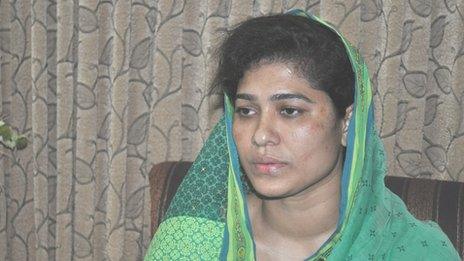'Enforced disappearances' haunt Bangladesh
- Published

Over a few horrifying hours one night last December Sabira Islam went from dancing with her husband at a party to frantically searching the streets of Dhaka after he had been abducted.
His body was found on the outskirts of the Bangladeshi capital early the next morning - he had been strangled.
Nazmul Islam was a local leader of the main opposition Bangladesh Nationalist Party (BNP) and his wife is convinced his death was politically motivated.
But she says she has lost her faith in Bangladeshi justice: "On the night when my husband was abducted, I went to the police and pleaded with them to find him. But no-one helped us.
"Even two months after... we don't have any clue regarding his murder," Mrs Islam says.
Nazmul Islam's murder was not an isolated incident. Human rights groups say it is just one of a growing number of "enforced disappearances and secret killings" in Bangladesh.
Almost four months on and the anger over disappearances is intensifying in Bangladesh.
The main opposition has called for a countrywide strike on Sunday to protest against the disappearance of a senior leader in Dhaka a few days ago.
Who is to blame?
The wife of another activist in Dhaka has a similar tale to tell.
"My husband was taken close to our house last year. Eyewitnesses say he was bundled into a van by people who said they were from law enforcement agencies. Even now we don't know his whereabouts," Jhorna Khanum, who works for a human rights group in Dhaka, said.
She also believes politics is behind Shamim Akhter's disappearance because he belonged to a left-wing party and had been involved in student politics for years.
Many of the families of those who have gone missing say that the security agencies are responsible for abducting their relatives. Concern is growing because these disappearances appear to be on the rise.
According to Dhaka-based human rights group Odhikar, only two people disappeared in 2009, compared with 18 in 2010. And in 2011 the number of disappeared shot up to 30. Nine people have disappeared since January 2012. The group says many more disappearances have not been officially recognised.
"This pattern used to exist during previous regimes. Now it is coming back and it's alarming," Odhikar secretary Adilur Rahman Khan says.
The victims have been opposition activists, local traders, workers and some who were abducted because of criminal feuds or business rivalries. Some of these people have been found dead - the whereabouts of all the others are unknown.
So what unites this varied group of people? Rights groups argue that the disappearances are down to a culture of impunity among the security forces, which means anybody who falls foul of the authorities is vulnerable.
Bangladesh's elite Rapid Action Battalion (RAB) police force is blamed for much of the wrongdoing. Human rights groups have documented nearly 1,600 extra-judicial killings since 2004 - and they say this number includes disappearances, those killed in so-called "fake encounters" where people are shot dead in allegedly staged gun battles, and people who have died in custody.
"Although the number of RAB killings has dropped following domestic and international criticism, there was a sharp increase in enforced disappearances, leading to concerns that security agencies have replaced one form of abuse with another," the New York-based Human Rights Watch said in its World Report 2012.
'Gang rivalries'
The Bangladeshi government said that report "was not correct" and security forces vehemently deny such accusations. They dispute the figures put forward by rights groups.
"These are baseless complaints. Law enforcement agencies have nothing to do with them. In fact, we have solved many abduction cases in the last three years," said Commander Mohammad Sohail, a spokesman for the Rapid Action Battalion.
Cmdr Sohail also disputed explanations provided by human rights groups on disappearances, attributing them to political and gang rivalries.
"If you see the profile of some of those abducted or who are missing, you will find that they had lots of opponents and were involved in crime themselves," he said.
Indeed, following an outcry over continuing abductions and killings, the government ordered an inquiry in December. Security personnel say they have made significant progress and have even solved many cases.
"They are carrying out their duty properly and are working to prevent, not to enforce, disappearances," Bangladeshi Home Minister Sahara Khatun said, in support of the security forces in January.
Nevertheless, human rights activists blame the country's present political culture for the increasing violence.
"Unfortunately, our politics is a kind of violent politics and there is a culture of impunity," Odhikar spokesman Mr Khan said.
"That's why we see more human rights violations through political violence. Probably, some in the law enforcement agencies are taking advantage of that."
Meanwhile, families struggle to deal with the loss of their loved ones.
"My youngest son, who is five years old, still keeps asking me when his dad will come back. I don't know how to answer him," Sabira Islam says.
- Published15 December 2011
- Published22 December 2010